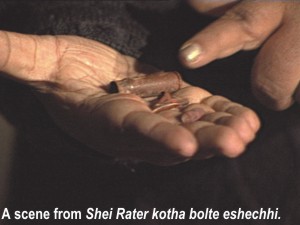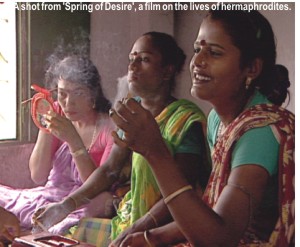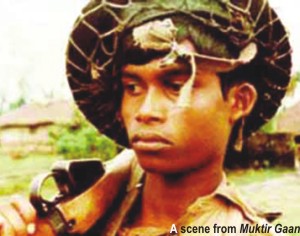|
Film
Documenting
Bangladesh
Elita
Karim
Everything
we feel deeply must be expressed -Hans Hartung
 Earlier
this month, film buffs got a rare treat with the three-day-long
screening of 14 documentaries, titled 'Documenting Bangladesh'
featuring films made between 1971 and 2004, to project the
true picture of Bangladesh. The recently formed Bangladesh
Documentary Council held the screening at the National Public
Library with the aim of exposing the talents of independent
filmmakers. All the documentaries were about Bangladesh, made
by both well-known and upcoming Bangladeshi filmmakers. Earlier
this month, film buffs got a rare treat with the three-day-long
screening of 14 documentaries, titled 'Documenting Bangladesh'
featuring films made between 1971 and 2004, to project the
true picture of Bangladesh. The recently formed Bangladesh
Documentary Council held the screening at the National Public
Library with the aim of exposing the talents of independent
filmmakers. All the documentaries were about Bangladesh, made
by both well-known and upcoming Bangladeshi filmmakers.
The 18-minute
documentary 'Stop Genocide' depicts the similar stories of
mass killings in different countries. A clear parallel is
drawn in the narration, between the genocide in Vietnam, Algeria
and Bangladesh during the Liberation War. Like many famous
filmmakers, namely Joris Ivena, Andrzej Waja and Alain Resnais,
Zahir Raihan also focused on Man's struggle against inhumanity
and war. The audience, especially those young people who are
oblivious to the atrocities of decades ago, were deeply moved
by the scenes of misery and horror. The images of thousands
of refugees walking for days and nights and camping at the
Indian border are probably the most heartrending of scenes.
In one of them, a little girl was walking silently, once in
a while breaking into tears. Later, the film explains that
this 11-year-old girl was raped by a group of Pakistani soldiers,
after her mother, father and brothers were shot right in front
of her eyes.
'One Day
in Krishnanagar', a 53-minute film speaks about a day's struggle
by fishermen, to keep themselves and their families alive.
The film not only shows the hard labour and constant prayers
by the fishermen, but also their spiritual aspirations, dreams
and their moments of leisure are moulded into this sensitive
presentation. The documentary has been directed by Manzare
Hassin, Tanvir Mokammel and Tareque Masud and produced by
the Bangladesh Short Film Forum, Goethe Institut, Munich.
Tareque
and Catherine Masud's much acclaimed 'Muktir Gaan' was also
screened, to the delight of many. This 80-minute film relived
the times, when people from all walks of life -- some just
teenagers -- fought for independence in any way that they
could. Here, a group of youngsters tour all around on a truck
for days together, singing and spreading the message of freedom
and the pride in having one's own land, and enjoy the sense
of belongingness. Some of them, today, happen to be famous
artistes in various cultural fields. According to one of them,
this 80-minute documentary captures only a tiny bit of the
actual feeling and the passion that drove these youngsters
to go around the country, talking to people, experiencing
their lives and letting everyone sense the emotion of freedom.
There
were other documentaries, portraying the Liberation War of
1971 and people's fight against the atrocities. 'Tale of the
Darkest Night', a 43-minute short film by Kawser Chowdhury,
narrates the brutal killings at Dhaka University, by the Pakistani
army. The survivors, witnesses and the families of the victims
are documented in this film.
 'Shadhinota',
a 37-minute documentary by Yasmine Kabir, shows Gurudasi Mondol.
After being sexually abused in 1971, she became mentally unbalanced.
During the war, Mondol watched her family being brutally killed
by the Razakars. She was imprisoned and raped by the commanders
of the Razakars, till she was freed three months later by
the Bangladeshi Liberation Army. Thirty years later, she aimlessly
roams about on the streets. Even within her madness, she has
a story to tell and a power to survive. 'Shadhinota',
a 37-minute documentary by Yasmine Kabir, shows Gurudasi Mondol.
After being sexually abused in 1971, she became mentally unbalanced.
During the war, Mondol watched her family being brutally killed
by the Razakars. She was imprisoned and raped by the commanders
of the Razakars, till she was freed three months later by
the Bangladeshi Liberation Army. Thirty years later, she aimlessly
roams about on the streets. Even within her madness, she has
a story to tell and a power to survive.
'Achin
Pankhi', a 60-minute film by Tanvir Mokammel, speaks of bauls,
an integral part of our culture. The film speaks of the mystic
Lalon Shah, and the various spiritual stages of these bauls.
'Rokeya' a 61-minute film by Manzare Hassin is based on the
works and life of Rokeya Sakhawat Hossain herself. This film
rediscovers the various aspects of Rokeya's personal life
and works from the perspectives of the present generation
of women.
'Black
House' focuses on the pollution, carbon, smoke and the darkness,
which constitute a normal factory, where a number of child
workers work to earn a living. This 30-minute film by Tareque
Shahriar brings out the root causes leading to child labour
and issues that have been raised about these children's future
repeatedly by many, but in vain.
 Another
interesting documentary of Manzare Hassin's is the 42-minute
'Our Boys', which shows a group of young boys, their acceptance
of their present laid out by the past and how they face the
wind not knowing which way it is actually blowing or taking
them. Another
interesting documentary of Manzare Hassin's is the 42-minute
'Our Boys', which shows a group of young boys, their acceptance
of their present laid out by the past and how they face the
wind not knowing which way it is actually blowing or taking
them.
'My
Migrant Soul', a 35-minute documentation by Yasmine Kabir,
depicts the crumpled dreams of Shahjahan Babu, when he goes
to Malaysia to earn a better living, but ends up as a victim
of a ruthless system.
'Sand
& Water' an 84-minute representation by Shaheen Dil Riaz
speaks of Jamuna, one of the three main rivers in Bangladesh,
and its effect on the people of the Char lands and their struggle
for water.
'Spring
of Desire' a 24-minute film by Shabnam Ferdousi brings to
the forefront the issues faced by hermaphrodites or hijras.
Constantly plagued by confusion, hatred and ignorance from
the mainstream community, the film tries to show that, they
are people though different having the same emotions and desires,
just like any other human being.
Copyright
(R) thedailystar.net 2005 |
